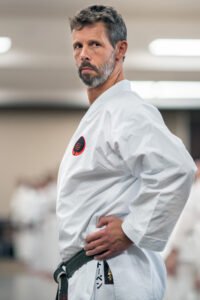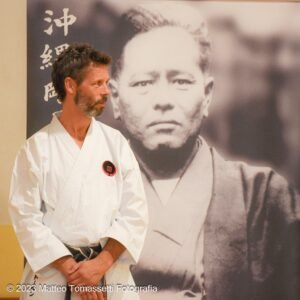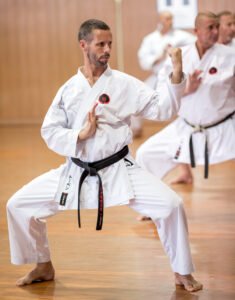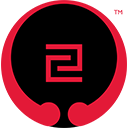By Sensei Torben Svendsen – IOGKF Denmark 7th Dan

Did you ever sit in the nature for a while, letting your thoughts drift?
In the begining you might think that you see everything in front of you. You might start getting bored by looking at the same thing… but if you get passed your boredom and sit a little longer, details starts to appear. You might see a different tree, a bush or even an animal might appear for you for the first time, even though it was there all the time…
Kihon (Basic training) in Karate is not any different than this. In the process of training Kihon it is almost inevitable that you will get bored, that your mind will drift and you will feel a strong urge to do something else… something more fun or less boring… Just keep on going.
Your Physique
Kihon teaches you the fundamentals of Karate, it’s the basics, the foundation of your “Karate
house”. Through this training you’ll achieve a greater physical strength, better precision, better reflexes and the ability to concentrate your power at the moment of impact (Kime).
Proper Kihon training also helps you to avoid injuries.
The numerous repetitions are important to create a natural body response.

Awareness and Boredom
You might find it boring to do the same thing over and over again, but if you open up your mind, your senses and your curiosity, then you start opening up for a greater and deeper understanding of the basic techniques and ways to move in Karate.
This is as important for the novice as for the most advanced Karate–ka. For the beginner, you have to learn the new ways of using your body and this requires thousands of repetitions of each technique. For the advanced, you have to keep polishing and refining all your techniques in order to fully master them.
Beware that boring can come in different shapes. Especially if the technique is fairly new to you, after a certain amount of repetitions then you might start getting bored… well, this is the time to continue…
If you are a more advanced student, and the technique is well known to you and you have repeated it numerous times, here too there’s often a sense of boredom kicking in, you start to lack attention to what you are doing because “you know it so well already”. This is often where you get sloppy, you forget the small details and you start making mistakes.
No matter if you are a beginner or a very advanced student, the most important thing you have to train is your awareness. This is in fact no different than in our daily life… every day we have to keep aware of what we actually are doing or else life is slipping past us.
By having your Kihon technique to focus on, it is a very beneficial way to train your awareness and we might also learn that the trivial things in life are maybe not so bad or boring and that we can gain wisdom, if we are curious and aware.

The Mental Benefit
Kihon techniques should be ‘simple’* (and yet advanced enough to challenge your brain) so that you can do them again and again without thinking…
In this way you can reach a point where your brain can “switch off”, yet still be aware, and your body just does the job.
The task of co-ordinating hands, feet, tanden… the whole body in each technique is very beneficial for developing and in keeping your braincells “alive”.
Visualizing opponents or other obstacles while performing Kihon techniques helps you to become stronger as well as more precise and focused.
Allowing your brain to be in “free flow” while performing numerous repetitions of physical techniques despite your exhaustion, self-pity and an urge to give up, can open a deeper dimension of yourself, an “emptiness” or a zen-like feeling. You will not be able to reach this state if you are giving up.
An important thing to be aware of which will help build mental strength and persistence is to keep your promise towards yourself. When you decide on a certain number of repetitions then you have to follow them through, even past the point where you feel like giving up.
When you make a promise to yourself you have to keep it… If you can’t trust your own promises how then will you be able to trust others or expect others to trust in you?
*Simple Kihon is actually not that simple at all…E.g. take an Age Uke (rising block) in Heiko dachi; arms are crossing in front of the chest, one arm goes up and stops just above the head one fist in front of the forehead, the other goes down to the armpit. The arms rotate in opposite ways. The feet are parallel and grounded, knees bend. At the moment of impact the Tanden is tight. These and more small points have to be taken care of by our brain, nervous system and body… It’s actually a quite big task when you think of it.

A little calculation
It is said that in order to master something you have to do 10,000 repetitions… So let’s do a little calculation to see how many 10,000 actually is?
If for example you do 100 Age Uke every day. Then it’ll take you approximately 6+ months before both your arms have done the 10,000 Age Uke.
Then think about your Kata…
How many repetitions of one particular kata is it likely you can do every day?
Let’s say you do 10 kata every single day then you’ll have to do it for 2 years and 8 months. In Goju–Ryu we only have 13 kata, still I guess it’s enough for a lifetime!
Prepare for self defence – Prepare for fighting
To continue past the boredom, past the trivial, past your minds excuses for stopping, past your self pity, past the point where you are exhausted, past the point where you think you can’t go any further, past the discomfort, you will have the opportunity to open up to an “emptiness” a zen like feeling.
This is a way to overcome your own limits in a safe way.
… This is your true fighting skills continuing even though it’s not comfortable, a fight is not comfortable either.
Never give up – Nana korobi Ya oki.
(Fall down seven times, stand up eight)
